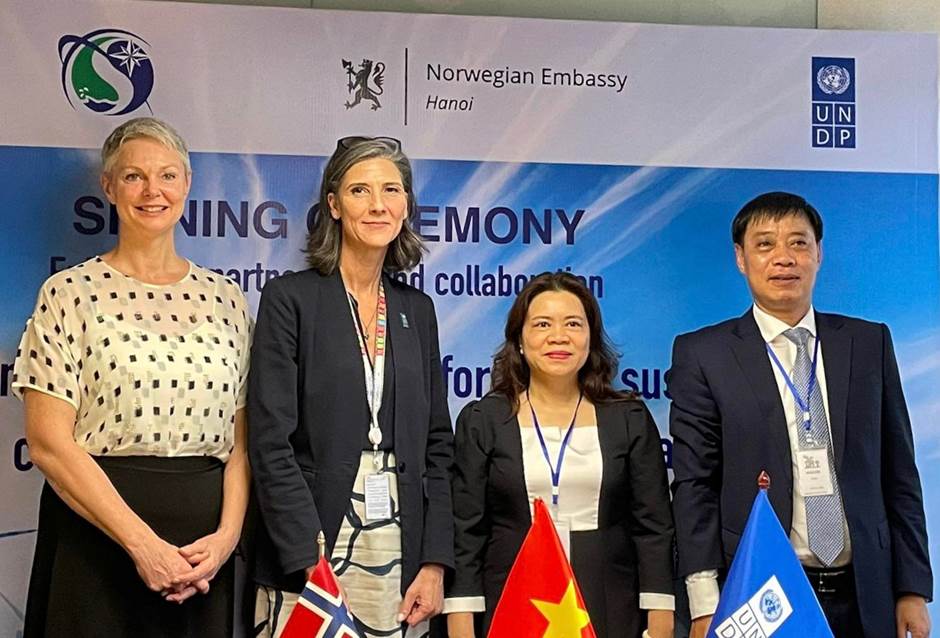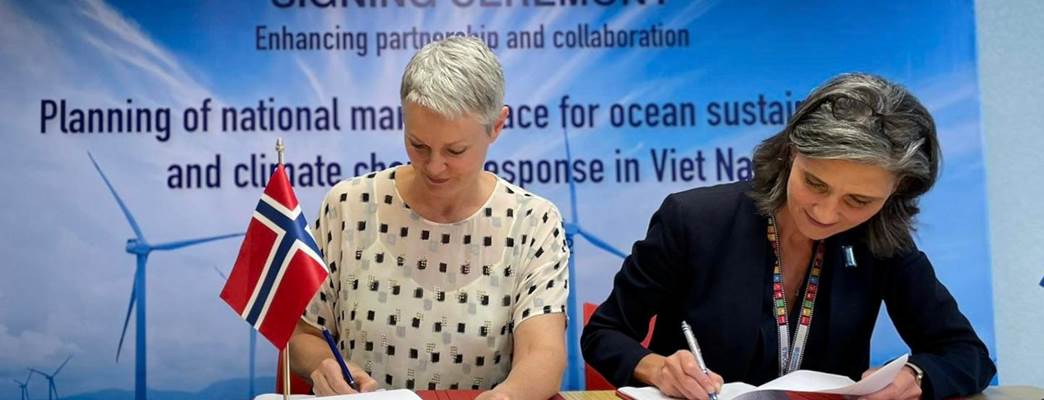Ambassador Solbakken attended the Signing Ceremony in Hanoi on 23 November together with representatives from UNDP, Viet Nam Administration of Seas and Islands, Viet Nam Meteorological and Hydrological Administration.
Speaking at the event, Ambassador Solbakken said "Norway has good experience in development and application of marine spatial planning (MSP) that can be shared with Vietnam. In order to achieve the high-income aspiration by 2045 and net zero commitment by 2050, Vietnam needs to shift its growth model, essentially through a smooth energy transition process as well as unlocking its blue economy potentials. Vietnam therefore needs to build its capacity in science-based, sustainable ocean management, in which MSP is essential. We are happy to work with UNDP Vietnam and our Vietnamese partners in this process through a three-year project “Planning of national marine space for ocean sustainability and climate change response in Vietnam” that we signed today".
The new technical package will assist the Vietnamese government in strengthening and implementing maritime spatial planning (MSP). It will also assist Vietnam in creating and establishing a more rational structure of marine space and the interconnections between its uses, balancing the need for growth with the need to maintain marine ecosystems and achieving social and economic goals in an open and organized manner.
This endeavor specifically aims to promote a cross-sectoral approach to the management of the integration of economic, environmental, and social concerns in strategic planning and long-term investments. The MSP is not intended to replace sector-specific planning. Instead, it tries to provide direction for decision-makers responsible for specific sectors, activities, or issues to make more confident, complete, and complementary decisions.
The technical assistance package will take place at central level and in three sites at local level. The sites were selected based on the following criteria, namely: a small eco-region with the potential for a practical solution; political and administrative support; the availability of a reasonable amount of spatial biophysical data and information of critical resources; and a competent and willing authority to develop and implement the marine spatial plans.
Viet Nam is a coastal country with more than one-third of the population living in coastal areas. The economy of the sea, coastal provinces, and cities account for approximately 50 percent of the country's gross domestic product (GDP), with the marine economy alone contributing 20 to 22 percent. However, Viet Nam's ocean health is threatened by habitat fragmentation, degradation, loss, fishing and other kinds of overexploitation, climate change, and pollution, mainly marine litter.
Marine resources, including coral reef in Viet Nam, has been experiencing degradation and dramatic decrease. Located in a privileged geopolitical position in the East Sea, in addition to the myriad of marine resources, Vietnam boasts of petroleum, natural gas, and minerals in coastal and offshore areas that have the potential to bring significant economic benefits to the national and local economies. While tourism, petroleum, shipping, fisheries, and renewable energies have been growing fast, progress has been slow. There is thus the significant potential to diversify the economy and respond to climate change, including marine renewable energy, ocean wind power, marine pharmaceuticals, and upscaling of algae and seaweed production that complies with environmentally sensitive development.
"The Ocean provides significant resources for a green and blue economic rebound and offers great potential for inshore and offshore wind power, which, if sustainably developed, will support energy security and help Viet Nam meet its commitment of net zero emissions by 2050," said Ms. Ramla Khalidi, UNDP Resident Representative in Viet Nam. "UNDP will continue to accelerate and strengthen the work on Marine Spatial Planning, which is vital to unlocking the potential of the Blue Economy, and in particular to unlock Viet Nam's enormous potential for marine wind energy as a key renewable power source for the country's climate target."
The three-year technical package will accelerate progress in Marine Spatial Planning by emphasizing the promotion of research, technology transfer, and innovation in the marine sector. It will conduct integrated planning that promotes sustainable marine development in the target province areas.
At the ceremony and in the witness of Norwegian Ambassador Mrs. Hilde Solbakken, UNDP, Viet Nam Administration of Seas and Islands and Viet Nam Meteorological and Hydrological Administration also signed an aide memoire to strengthen collaboration in the areas of Marine spatial planning, Climate information services, and assessment of renewable energy potential, especially offshore, nearshore, and onshore wind power potentials.

News about the event on local media
UNDP, Norway to support Vietnam's spatial planning for sustainable ocean (vovworld.vn)
